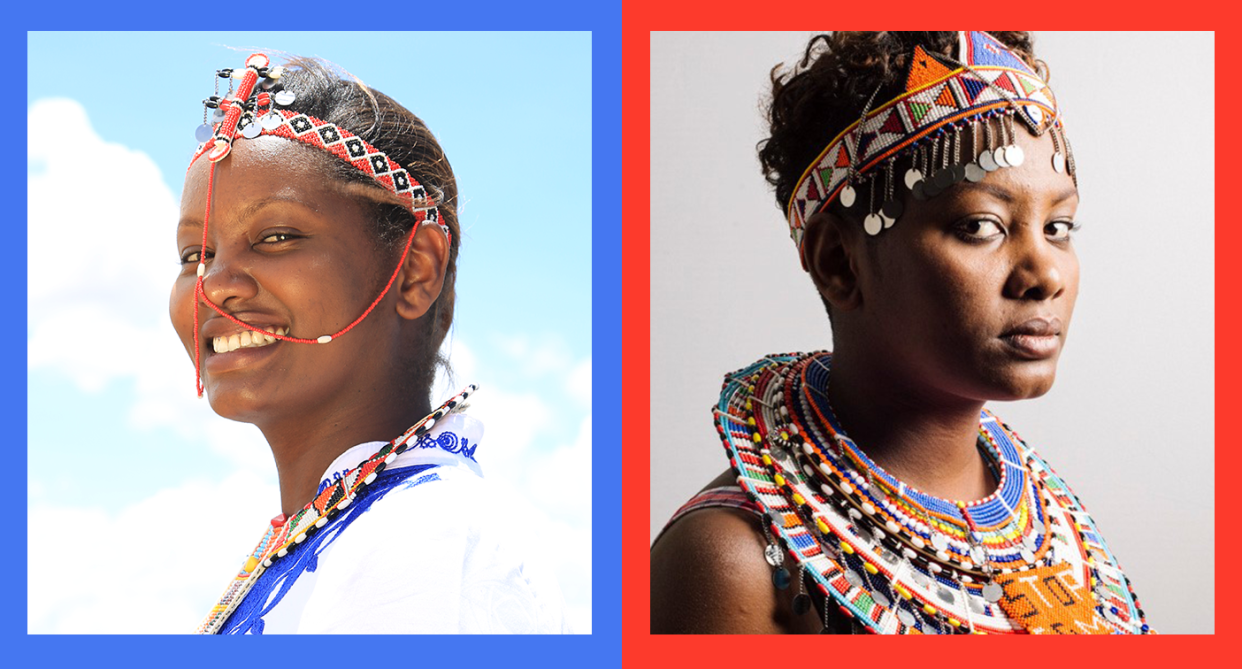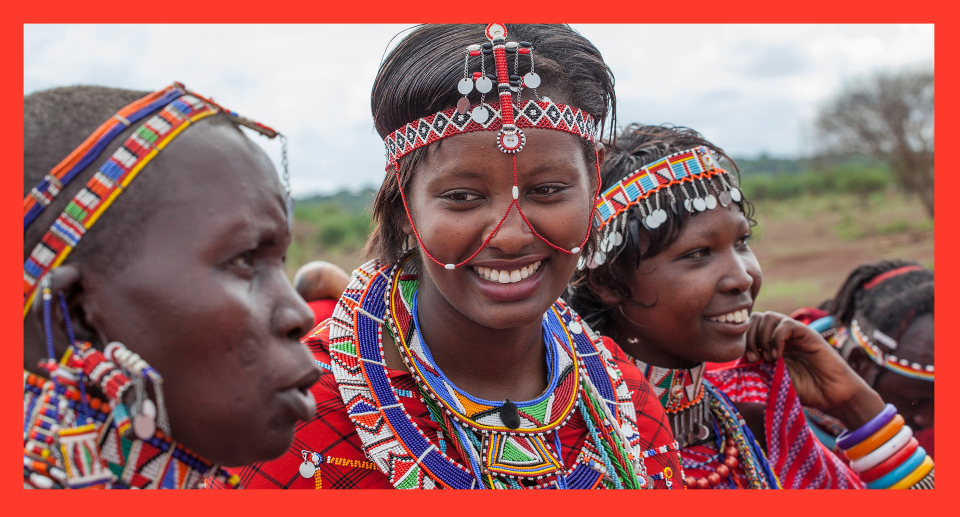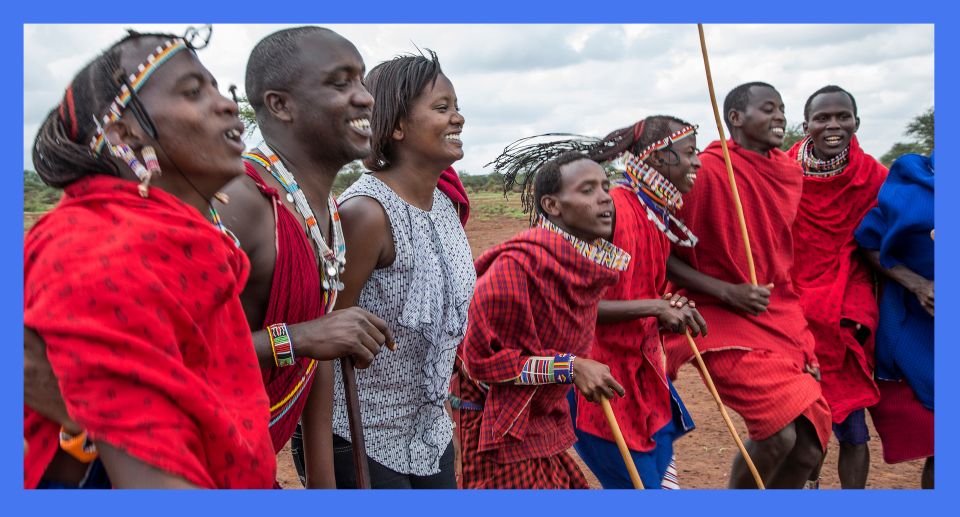This 27-year-old Maasai woman helped 15,000 girls escape ‘the cut’

When Nice Nailantei Leng’ete was a child growing up in the Kenyan village of Kiana, she was expected to undergo the Maasai practice of “female cutting” – commonly referred to as female genital mutilation (FGM). “I escaped by running away,” Leng’ete tells Yahoo Lifestyle, adding that the first time she ran away from the FGM ceremony — at age 8 — she hid with her sister in a tree until it was over. Now, almost 20 years later, Leng’ete has helped nearly 15,000 girls escape “the cut” and the child marriage that usually follows soon after.
This year she was honored for her work by being named one of Time’s most influential people, and she has given a TEDx talk about her experience. It has been a hard-fought battle for Leng’ete, particularly in the male-dominated Maasai community where she grew up, but Leng’ete has helped introduce alternative rites of passage to the community and is working toward the goal of ending child marriage and FGM in Africa by 2030.
“FGM, for Maasai, is a rite of passage from girlhood to womanhood. Women are not considered women unless they have gone through FGM,” Leng’ete tells Yahoo Lifestyle about the origins of the centuries-old custom of female circumcision. “FGM in my community connects to girls ending their education, with child marriage, and with teenage pregnancies. A girl is 10 or 12 years old when she undergoes FGM. Then she’s told she’s a woman, and that means she’s ready for marriage, and that means she has children. They all go together.”
Leng’ete understood this at a young age and wanted a different future. “I saw pain. I saw death. Since I was 7 years old, I used to attend these ceremonies in my community with girls undergoing FGM. I saw my friends leave school and get married. And I wanted to continue my education,” she says.
Leng’ete ran away from the ceremony twice. When she returned the second time, her grandfather, a respected village elders, pressed her on her aversion to the ritual. “‘I’m only 8,'” she told the New York Times she remembers telling him. “‘Wait until I am 9.’ She added, ‘I was trying to bargain.'”
Eventually, she told her grandfather that she would rather run away forever than endure the cut. Not wanting to lose her, he allowed her to forego the ritual. Even though she had her grandfather’s permission to forego the ritual, Leng’ete was ostracized by the community. “Families wouldn’t let me play with their daughters,” she told the New York Times. “Everyone saw me as a bad example; someone who disrespected her family and went against the ways of the community.”

Without the pressure of marriage, Leng’ete became the first girl in her village to go to high school, and her school uniform intrigued the other women in her village — her unique clothing acting as a bridge that brougt her back from exile. Women and girls in the Maasai community began to see Leng’ete as an inspiration — a point of hope — and to seek her out for help avoiding the cut themselves. While she hid those who asked for assistance, this made her a wanted woman in her village. So she decided on another tactic: bargaining.
While women are traditionally not allowed to address village elders, after Leng’ete attended an adolescent and sexual health workshop run by Amref, a Kenyan health organization, she convinced the elders that she needed to share what she had learned with the rest of the village. At first, no one attended her meetings or listened to her teachings, but little by little, Leng’ete got the young men in the community engaged in conversations about health, sex — and, eventually, FGM. After four years of discussions, she managed to persuade the men in her village that the community at large would be more prosperous if women were able to stay in school longer, marry later, and forego the cut. Her community also bestowed upon her the Black Walking Stick. “It is a very special stick that symbolizes leadership. It gives you respect and power within the community. It is only given to leaders; you can command with it, rule with it,” Leng’ete says. “It was a great honor to be given it by my own community because it means that I am one of the leaders.”
In 2014, the Maasai elders — who rule more than 1.5 million Maasai people — formally renounced the practice of FGM, and it was thanks to Leng’ete. She became the first woman to address the village elders at the seat on the foot of Mount Kilimanjaro.

Leng’ete helped introduce alternative rites of passage to the Maasai. “They keep all that is good in the culture and only replace the harmful part, which is the cut,” she says. “The special ceremonies, blessings of the elders, and everything else is kept to celebrate the transition from girlhood to womanhood. The cut is replaced with education. Girls can now become women in my community without the cut, and they can continue with their education instead of getting married and having children at a very young age.”
Today, Leng’ete is doing all she can and working with the organization Amref Health Africa to help young men and women learn about sexual and reproductive health and rights. Even though Kenya outlawed the cut in 2011 and the Maasai people abandoned it in 2014, the law is difficult to enforce, especially in rural communities. Leng’ete’s work on the ground is critical to spreading the message about FGM. “We need to reach more political leaders, more elders, more women, more men, more boys, more girls, more circumcisers,” Leng’ete says. “We need to reach more people through community dialogue and working together.”
“I’m driven by passion,” Leng’ete adds. “Being able to protect these younger girls from these harmful practices is what I want to do; it’s an important job. When I see the girls in school, that’s my happiness. I’m hoping to reach many more — every girl — if I’m able.”
Read more from Yahoo Lifestyle:
Dennis Quaid says cocaine once consumed his life — here’s how the drug hijacks your body and mind
‘Be More Chill’ star Lauren Marcus on her alopecia diagnosis: ‘I am trying to find the best in it’
Fat and fit: These women are redefining what fitness looks like
Follow us on Instagram, Facebook, and Twitter for nonstop inspiration delivered fresh to your feed, every day.


